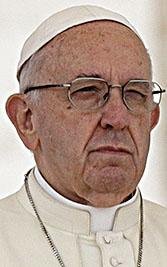VATICAN CITY -- Pope Francis has decreed that the death penalty is "inadmissible" under all circumstances and that the Catholic Church must work to abolish it, changing official church teaching to reflect his view that all life is sacred and there is no justification for state-sponsored executions.
The Vatican said Francis had approved a change to the Catechism of the Catholic Church -- the compilation of official Catholic teaching -- to say that capital punishment constitutes an "attack" on the dignity of human beings.
Previously, the catechism said the church didn't exclude recourse to capital punishment "if this is the only possible way of effectively defending human lives against the unjust aggressor." Previous popes have upheld that position, while urging an end to the practice.
The new teaching, contained in Catechism No. 2267, says the previous policy is outdated, that there are other ways to protect the common good and that the church should instead commit itself to working to end capital punishment.
"Recourse to the death penalty on the part of legitimate authority, following a fair trial, was long considered an appropriate response to the gravity of certain crimes and an acceptable, albeit extreme means of safeguarding the common good," the new text reads.
It said today "there is an increasing awareness that the dignity of the person is not lost even after the commission of very serious crimes." New systems of detention and sanctions have been developed that don't deprive the guilty of the possibility of redemption, it added.
"Consequently, the church teaches, in the light of the Gospel, that the death penalty is inadmissible because it is an attack on the inviolability and dignity of the person and she works with determination for its abolition worldwide," reads the new text.
Francis has long railed against the death penalty, insisting that it can never be justified, no matter how heinous the crime. He has also long made prison ministry a mainstay of his vocation and even opposes life sentences, which he has called "hidden" death sentences.
The death penalty has been abolished in most of Europe and South America, but it is still in use in the United States and in several countries in Asia, Africa and the Middle East. Just this week Turkish President Tayyip Erdogan said Turkey could soon move to reinstate the death penalty, which it had abolished in 2004 as part of its bid to join the European Union.
In an accompanying letter explaining the change, the head of the Vatican's doctrine office said the development of Catholic doctrine on capital punishment didn't contradict previous teaching but rather was an evolution of it -- a defense to fend off critics who have already accused the pope of heresy for challenging past doctrine on capital punishment.
Cardinal Luis Ladaria, prefect of the Congregation for the Doctrine of the Faith, said the change aims to "give energy" to the anti-death penalty movement and "to encourage the creation of conditions that allow for the elimination of the death penalty where it is still in effect."
Francis is not alone. Perhaps the most famous Roman Catholic anti-death penalty campaigner is Sister Helen Prejean, whose book Dead Man Walking -- about her spiritual ministry to a man on death row -- helped fuel opposition in the U.S. to capital punishment.
In a tweet Thursday, Prejean said Francis' decision to change church teaching on capital punishment "has closed the last remaining loophole in Catholic teaching on the death penalty."
"This is a great day for human rights," she said.
In addition, plenty of Catholic organizations are active in the anti-death penalty campaign, including the Sant'Egidio Community, which together with Italian authorities always lights up Rome's Colosseum whenever a country abolishes capital punishment.
In a statement Thursday, Sant'Egidio said the change served "as another push to the church and Catholics, based on the Gospel, to respect the sacredness of human life and to work at all levels and on every continent to abolish this inhuman practice."
It was precisely Francis' citation of the Gospel, however, that sparked criticism from some on the Catholic right, who cited Scripture in arguing that Francis had no authority to change what previous popes taught.
Information for this article was contributed by Simone Somekh of The Associated Press.
A Section on 08/03/2018

